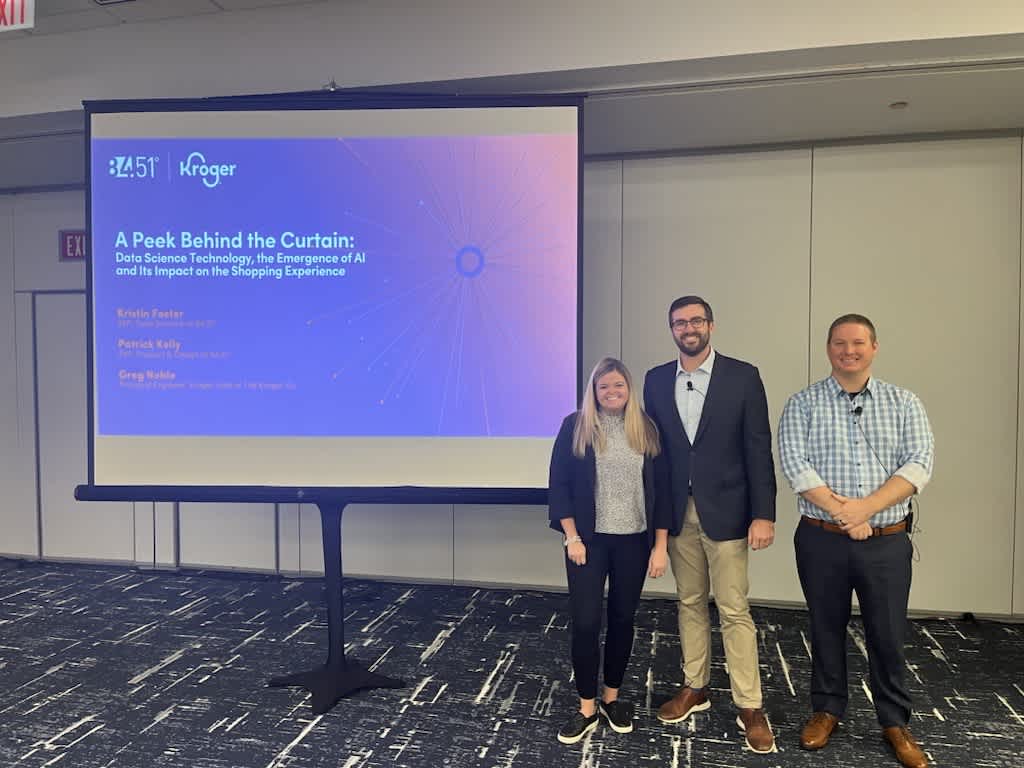
How data science enables the personalized experience customers crave

Personalized experiences are more important than ever when it comes to winning grocery shoppers. Personalization shows customers that you understand their needs, expectations and preferences and for that, they’ll return again and again. In fact, 76% of consumers said that receiving personalized communications was a key factor in prompting their consideration of a brand, and 78% said such content made them more likely to repurchase, according to a McKinsey & Company study.
It begins with a robust data science foundation. At P2PI Live in Chicago, 84.51°’s Senior Vice President of Data Science Kristin Foster and Senior Vice President of Product & Design Patrick Kelly joined Greg Noble, Director, Principal Research Engineer at Kroger, to provide an under-the-hood look at how data science and artificial intelligence are the underpinnings of a personalized shopper journey.
Imagine three customers—a first-time Kroger shopper, a price sensitive shopper and a gourmet shopper—with different preferences shopping for ingredients for a taco meal. When they open the Kroger app on their phone, they are each served personalized products and offers via a personalization platform built by 84.51°. The platform is composed of predictive and prescriptive machine learning algorithms, a form of artificial intelligence, that process thousands of first-party customer attributes sourced from the Kroger loyalty card program and other attributes such as the day of the week, online behavior, seasonality, basket size, modality and more. The platform scores those attributes to deliver an experience that is relevant and personalized for each customer, each time they shop.
Based on what customers place in their digital cart, the app also predictswhat customers are trying to make, such as guacamole, and will surface relevant product recommendations. For instance, when checking out, a customer might receive a notification powered by the “forgot something” algorithm asking if they would like to add avocados to their cart.
As customer preferences change and evolve, it’s important for the offers to keep pace with those changes as well. “With the techniques and technology that we have, we can create highly complex algorithms that we feed into our personalization platform [including] detecting changes in customer behavior,” said Foster.
Personalization touches every step of the customer journey from meal inspirations, personalized promotions to order fulfillment, point of sale, customer support, loyalty membership, and more. Indeed, personalized experiences have a real business impact, noted Kelly. New customers who engage with the Kroger app, for instance, typically show “a 10% increase in sales, versus if they were engaged in a non-personalized experience,” he said.
There are many more ways for data science and AI to improve the customer experience with personalization. Consider repeat purchases. Shoppers spend a lot of time gathering products and many of these are products that they consistently purchase—in fact 60% to 75% of those items are repeat orders, said Noble. “We see this as an opportunity for AI to come in and enhance the experience for our customers,” he said.
Powered by 84.51° science, Kroger, Noble continued, is testing Kroger Instinct, a new grocery delivery service powered by AI that automatically curates and delivers customers’ carts using their purchase history, saving them time from locating items that they regularly buy.
To get a sense of the amount of data needed to support personalized experiences like the ones described, 84.51° mines more than 10 petabytes of customer data—just 1 petabyte of data is equivalent to taking 5,000 photos for the next 50 years every day.
“That foundation of data robustness, data quality and granularity is imperative for the foundation that you build your sciences and analytics on top of,” Kelly said. Organizations that prioritize building such data capabilities put customer relationships on a new trajectory, delivering experiences that are powerful, simple, relevant and inspiring.
Visit our knowledge hub
See what you can learn from our latest posts.

